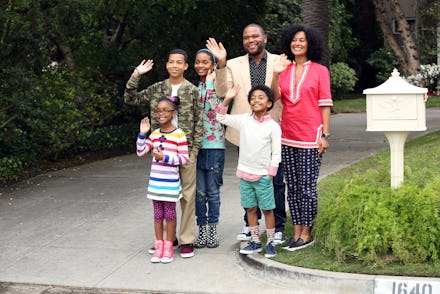'Black-ish' Lives in Its Own Oblivious Fantasyland

It's 2014 and black Americans have no shortage of crises keeping them occupied: Student debt. Unemployment. Police violence. Media smear campaigns. Not to mention Iggy Azalea and the fight over who invented cornrows (hint: black people).
Yet rising in defiance of these crucial topics is black-ish, ABC's new sitcom premiering Wednesday night.
Despite being network TV's only show built around a black family, black-ish not only feels toothless and dated, it completely ignores those key dilemmas that actual black people — people not living in sitcom wonderlands — are facing.
Anthony Anderson stars as Andre, a father and husband undergoing an existential crisis. He lives in a spotless suburban home with his four kids, curmudgeonly father and a wife who tolerates him even though he thinks her biracial heritage somehow precludes her understanding of what it means to be black. He also acts like his job is more important than hers — he works in media, she's an anesthesiologist.
But all is not well in their storybook life — being around so many white people has Andre feeling like his family's sense of black identity is quickly being destroyed.
Here's what he means: A central dilemma for Andre is his teenage son's decision to try out for the field hockey team instead of basketball. For Andre, this is not just embarrassing, it's downright unforgivable. The same son wants a bar mitzvah — he is not Jewish — to which Andre responds by subjecting him to a vaguely defined "African rite of passage" ceremony.
After some soul-searching, the episode's climactic scene represents a compromise: A cringe-inducingly titled "bro mitzvah," replete with Adidas tracksuits and a breakdancing showdown.
Wow: When all is said and done, Andre's concept of blackness seems as muddled and rooted in stereotypes as that of his white coworkers — one of whom insists on greeting him with elaborate handshakes and what seems like randomly selected Urban Dictionary slang.
Perhaps that's the point: There are many ways to express black identity, and tying people to one version is a basic denial of reality. black-ish embraces this premise as its feel-good core, ensuring us that the expectation of blackness that Andre peddles is not monolithic.
But: This makes the show seem like it casts a wider net than it actually does. black-ish is designed to entice a broad swath of the public, appealing to our aspirational tendencies by depicting an upper-middle class ideal that's grown increasingly out of reach for most Americans — especially black Americans.
Many have drawn comparisons to the Cosby Show for its implicit celebration of black upward mobility.
Yet such is inherently — and problematically — exclusionary. Considering the events dominating headlines today, is a show like black-ish what we really need? Is America really best served by being reminded that there are, indeed, a few black families who have the luxury of worrying whether "being black" is compatible with "eating yogurt"? Fantasy has always been the currency of mass entertainment, but at what point is a show like this simply out of touch?
Racial violence and institutional bigotry are admittedly heavy dilemmas for an ABC sitcom to tackle. But black-ish still can't escape the feeling that it might've been more relevant 15 years ago. Today, the struggles it depicts will likely fall flat for anyone who sees what the rest of black America is subjected to daily — the violence, the degradation, the persistent inequality.
Of course, the Cosby Show faced similar criticism in its day and still managed to be popular and successful. As was the case then, maybe the real issue is the absence of diverse depictions of black life on TV — the result being a heap of expectations for shows like black-ish to be everything to everybody.
Is it fair to place this burden on a fluffy and otherwise harmless sitcom? Maybe not. But with only one network series depicting the lives of a black American family, this is the reality we've been given. It's more an indictment of the broken system than anything else.